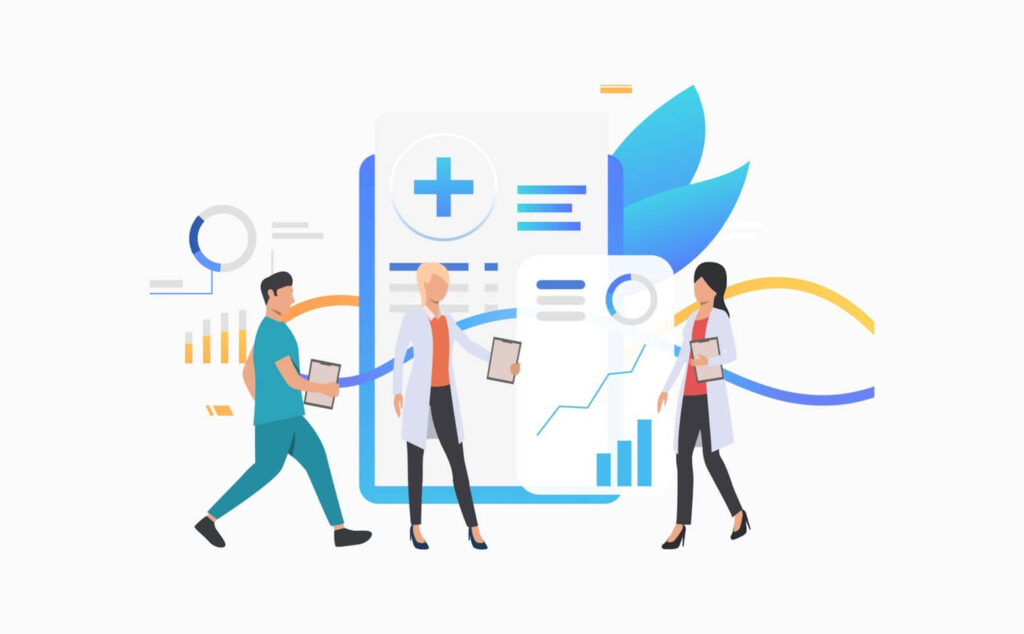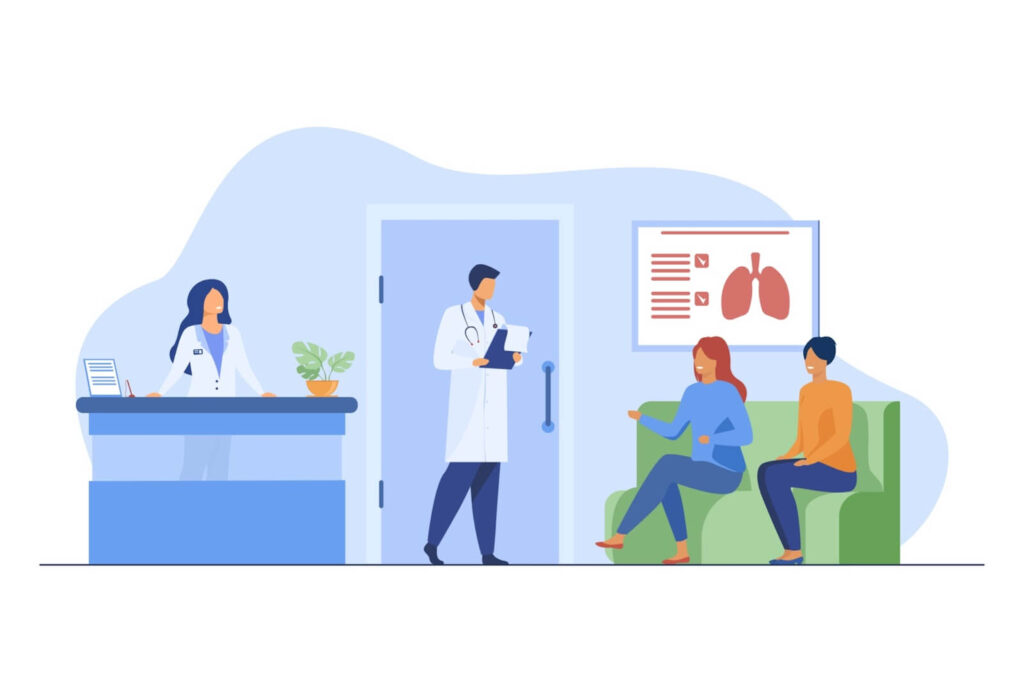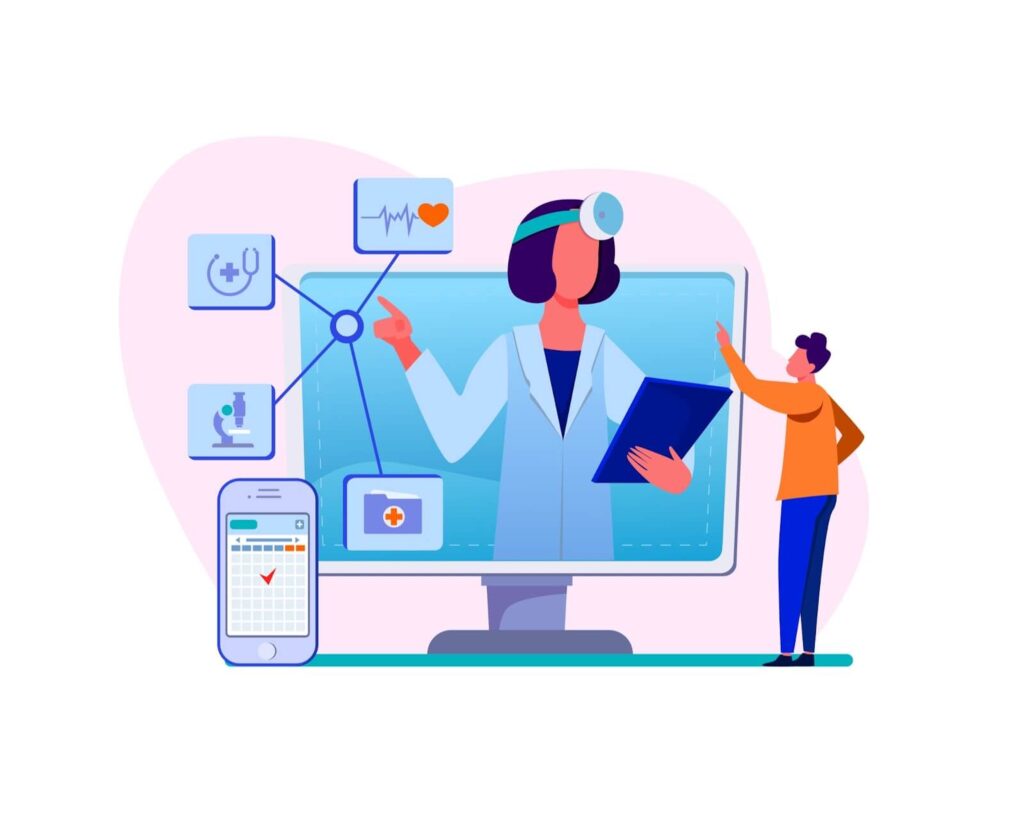July 22, 2022
How to Start Blockchain Development in the Healthcare Industry
Table of content
- How to Start Blockchain Development in the Healthcare Industry
- What is Blockchain?
- What is Blockchain in Healthcare?
- Benefits of Blockchain In Healthcare
- Is Your Healthcare Business Ready for Implementing Blockchain?
- How to Implement Blockchain in Healthcare
- What is the Future of Blockchain in Healthcare?
- How Can Interexy Help?
- Final Thoughts
- FAQs
Blockchain and healthcare are two buzzwords in the development world. While the digital healthcare industry still reaps benefits from restrictions caused by COVID-19, blockchain is the hottest trend in various applications. Just imagine how powerful they can be when combined together in one project.
Many of us are thinking about how the technology field is reflecting on building a stronger and more efficient future. And it is especially relevant for the healthcare space, which has always lacked functionality, speed, and protection. As the modern healthcare industry focuses on digital transformation, many clinics and healthcare organizations are starting to consider how blockchain works in healthcare.
This is because blockchain has been shown to significantly empower healthcare organizations to provide more efficient services, and speed up transactions through a secured, shared, and distributed ledger, which also adds another layer of security. Blockchain is also used by clinics to reinvent entire business models. To be more specific, a recent survey performed within many industries found that 60% of blockchain early adopters are experimenting with different business models or processes.
This article will show you how you can bring blockchain into the healthcare industry with definitions, benefits & steps. Let’s dive into the details!

What is Blockchain?
Blockchain, also known as Distributed Ledger Technology (DLT), makes the history of any digital asset unalterable and transparent by utilizing decentralization and cryptographic hashing.
Let’s take Google Documents as an example. When someone creates a new document and shares it with a group of people, this single document is distributed rather than being copied or transferred. This allows for a decentralized distribution chain providing access for everyone at the same time. All changes in this document are recorded in real-time, which aids transparency.
What is Blockchain in Healthcare?
Electronic Health Records (EHR)
Blockchain is the best solution for creating a single patient registry (Electronic health records). To be more specific, it will be a single base allowing for a high level of security, stable transactions, and global access. This infrastructure reduces worries about data synchronization. Therefore, any physician will have a chance to review the entire medical history to prescribe specific treatment, which can also be done only with the patient’s permission.
Drug Tracking
We all know that healthcare has the issue of counterfeit products. This is where blockchain comes into the picture, making transactions between the manufacturer and the distributor recorded in a chain. Therefore, the system can quickly allow you to check the authenticity of medications and learn more about the manufacturer for trust and the history of the movement. This is a top priority and the biggest issue in the industry. It is also becoming essential for medical devices, which have been proliferating alongside the adoption of more remote health monitoring.
Smart Contracts
Well-known players on the market, like Chronicled and Curisium, developed blockchain-based systems where many companies in the healthcare field like medical device OEMs, wholesalers, insurers, and healthcare organizations can authenticate their identities as organizations while also input contract details, track transactions of products and payment details for provided products and services. This process goes a step beyond supply chain management to allow trading partners and insurance providers to operate on entirely digital and sometimes automated smart contract terms.
Medical Staff Credential Verification
Just like tracking the provenance of a medical product, the blockchain ledger is also used in the healthcare industry to track the experience of doctors. Now trusted healthcare organizations can log the credentials of their medical staff, which significantly speeds up the hiring process for them.
Benefits of Blockchain In Healthcare
Even though there are many applications of blockchain in healthcare, some still don’t know how will blockchain affect healthcare in the future. Let’s explore it below:
1. Securing Patient Data
Securing sensitive patient data is one of the essential things any healthcare organization should worry about. This is especially vital in the era of hackers and digital attacks, which are growing every day. Blockchain is a tamper-proof, distributed, and incorruptible tool that can greatly help in protecting the data in a much easier and advanced way.
2. Patient Care
The distributed blockchain nature provides secure storage and retrieval of data, which can greatly help in preventing miscommunications or mistakes, leading to a faster diagnosis. This not only helps doctors make a clearer diagnosis but also improves overall patient care.
3. Remote Monitoring
Blockchain allows for electronic medical records, which can later be accessed and shared all across the globe in a few seconds. This also allows patients to review the information from the doctor in the comfort of their homes. In addition, blockchain makes this process safe and almost completely free from cyber-attacks as well. As a leading telehealth app development company, our team has extensive experience in the healthcare domain. Our custom telehealth app solutions allow clients to deliver effective, improved and secure care while also being compliant with strict industry’s standards like HIPAA regulation
4. Health Insurance Claims
Blockchain is also now used for claim processing and verification since it can show medical events chronologically. Since blockchain aids transparency, this history cannot be altered/tampered with for purposes of fraud. Explore our healthcare software development services.
5. Master Patient Indexes
Since blockchain keeps all the data in a single ledger, there is almost no chance of duplication. In addition, blockchain does not rely on one key, and patient data can be accessed by a lot of protected keys.
6. Longitudinal Records
These can be lab results, treatments, ambulance services, and even health records that can be easily accessed through blockchain to provide better services to patients and improve how the organization works.
Even though we have mentioned the most unobvious benefits of blockchain technology in healthcare, some of the most common also include data encryption, robust data, unchangeable databases, data provenance as well as traceable data.

Is Your Healthcare Business Ready for Implementing Blockchain?
How can you know whether your healthcare business is ready for blockchain or not and whether you will benefit from it or just waste time? Explore below.
Transactions
Blockchain is based on transactions. If you want to streamline transactions happening between multiple parties, like patients, healthcare organizations, insurers, and so on, then blockchain can be a great choice.
Trust
The decentralized nature of blockchain removes the need for a central authority to perform transactions. Instead of using a third party, participants of a blockchain-based system rely on validating nodes. Does this feature seem to bring value to your healthcare business?
Zero Intermediates
Is your business operating on a health record data management platform that works autonomously and benefits from having no intermediaries? Since data is validated by the blockchain, the operational costs are significantly reduced.
Higher Security
Public key cryptography mechanisms in blockchain guarantee data integrity and make it impossible for unauthorized parties to work with data stored on-chain. Is your healthcare business lacking trust and security due to attacks?
See Our NFT & Blockchain Development Process
Download this file to see how we helped our NFT clients, how we can lead you to success and what process we use to achieve this

How to Implement Blockchain in Healthcare
Healthcare blockchain technology can come in different forms and manifest through various applications like mobile, web, desktop, etc. Therefore, it is worth noting that when you want to know how to implement blockchain in healthcare, there will always be:
Back-End
This naturally means the blockchain itself, including self-monitoring smart contracts and adding server databases and APIs (based on your solution’s architecture).
Front-End
Here we mean a customer-facing application, which, as we mentioned, can be in various forms. The front-end piece of the product also includes a crypto wallet, which is used to generate a private key to guarantee that only the needed user can access the wallet. However, there will also be a public key that will be used by the user to interact with each other on the chain. When working together, these keys create the essence of anonymity on the chain.
Blockchain Technology Stack
To build the backbone of a healthcare blockchain solution, you will join one of the open-source blockchain projects, like Hyperledger. It contains many open-source tools, libraries, as well as other tech bits for developing distributed ledgers.
You can also consider using alternatives such as IPFS, Corda, IBM Blockchain Platform, and BigChainDB, among others.
Customer-Facing Applications
If you want to build mobile and web applications sitting on top of your blockchain protocol that future users will interact with, you can use the following technologies.
- Mobile allows for React Native for cross-platform mobile apps or goes native with Kotlin/Swift.
- Web apps work on Angular or Ruby or go with React and Node.
Testing & Deployment
Any blockchain product should undergo a rigorous QA process on a test net. It is a test chain having the properties and infrastructure of the mainnet. Once you deploy your healthcare app to a test net, you can check all the features without spending money on fees with every transaction.

What is the Future of Blockchain in Healthcare?
New Modalities for Consent
Blockchain seems to drastically change the way in which informed consent is given, which will overcome the current fragmentation where the patient signs a specific consent for each visit, therapeutic intervention, or any other diagnostic examination. This approach is suggested to simplify the administrative procedures and minimize the steps that patients have to go through on their journey through the disease.
Micro Payments and Data Monetization
Blockchain technology will greatly support and ease monetary transitions between patients and care centers, especially when talking about micropayments. The brand-new healthcare models could see the reimbursement of the services offered by the healthcare providers according to the well-being of patients rather than on the quantity. There are numerous real-life cases of pilot applications that are based on blockchain to provide the monetization of health data (as genomics) by users who agreed to share their data to improve the quality of healthcare.
New Methods for Provider Accreditation
Blockchain can also be used in upcoming years as a simple way to create and update directories of accredited healthcare providers, which is a process that has to be confronted with the organizational complexity of health systems.
How Can Interexy Help?
Interexy is on the list of top Dubai & Miami Blockchain development companies in 2022. Our expertise and only relevant resources make it possible to provide top-notch solutions to the demanding market. Combining our in-depth background in healthcare, our team has all the needed skills to develop brand-new healthcare solutions based on blockchain technology.
We have been a trusted partner for Solstice, which is a healthcare marketplace that provides patients ownership over their health data and helps therapeutic companies accelerate their innovation via comprehensive, longitudinal health data.
The product was developed as a web service used by therapeutic organizations (pharmaceutical companies, biotechs, etc.) to collect patient data, like genome analyses, health records, X-ray pictures, and more. To ensure the safety of users’ data, we use data encryption that would convert data from a readable format into an encoded format.
By using our blockchain application development services, you are guaranteed to get quality products that provide a seamless user experience, data protection, HIPAA compliance, and success in this challenging market.
Final Thoughts
Blockchain and healthcare are the hottest trends. They provide many opportunities for anyone wanting to enter this space and can become an ultimate solution when combined together. However, there are still some vital things you need to consider and learn before developing a blockchain product for the healthcare industry, which you can find in this article. Book a free call to get a clear picture of how you can enter healthcare with blockchain!
FAQs
What is blockchain technology in healthcare?
Blockchain technology is an emerging solution being applied for creating innovative solutions in many sectors, including healthcare.
How does blockchain work in healthcare?
Blockchain offers various applications in healthcare, like electronic health records, drug tracking, medical staff credential verification, and so on.
How to implement blockchain in healthcare?
You need to learn a tech stack needed for blockchain or hire an experienced team that will do it for you.















